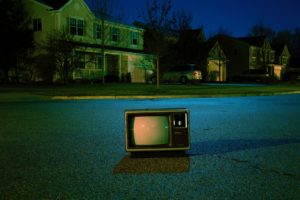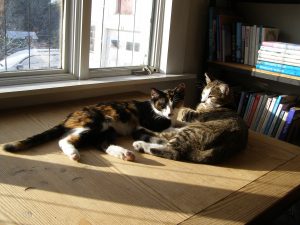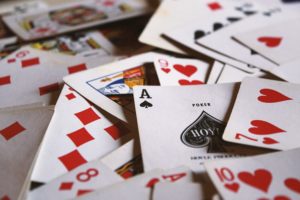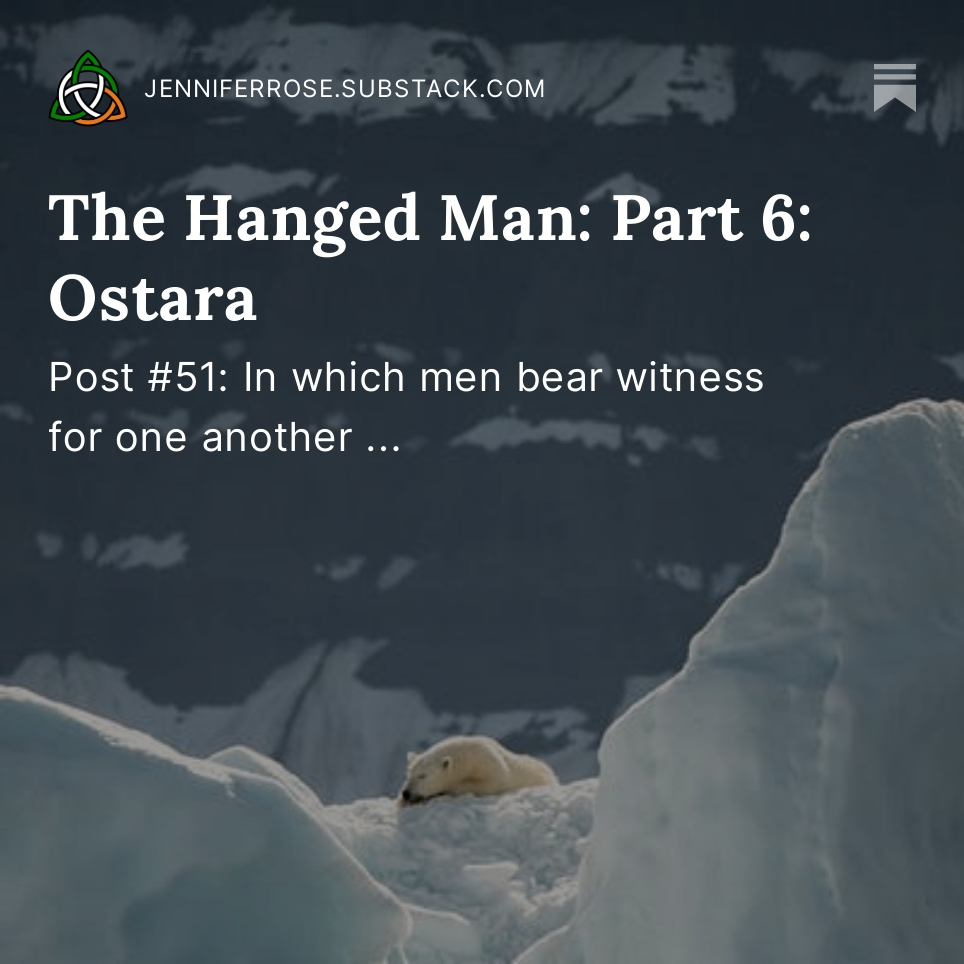by Jenny Rose | Dec 24, 2022 | Connection & Community, Emotional Intelligence
I’m continuing to play with blind journaling. It’s most useful when I notice physical and emotional signs of anxiety and speeding but am not sure what’s triggered them. Taking off my glasses, turning off the light (I journal early in the morning while it’s still dark), and concentrating on feeling out the roots of my symptoms leads me to the source of my distress. Doing this when I first notice symptoms interrupts the spiral of anxiety that might otherwise follow and increase during the day.

Photo by Nicole Mason on Unsplash
It works much better than distraction, like playing solitaire, which I’m still refraining from doing.
I think it will also be a great tool for concentrated writing time when I want to explore a prompt or address a specific scene or exchange of dialog.
I’ve been wondering this week how things might change if we were blind. All of us. A blind world.
A significant part of our brain is tied to interpreting the endless barrage of information coming through our eyes. Not only does life spool before us every waking hour, we add unmeasurable visual information as we look at our screens and consume media.
I notice how much simpler, less stimulating, and less distracting life is when I shut my eyes. There is a cool, spacious space between sleep and eyes open. It’s quiet in that space. I’ve written about visual noise before, which I’m particularly sensitive to. When I close my eyes, I immediately feel quieter. My attention is not demanded by visual input. I can come into presence with myself more easily. No surprise we meditate with our eyes closed.
My favorite sense is touch. Vision can lie, as can words we hear, but touch is honest. I can read pain in the way a friend holds her body, in her skin color, in a thousand subtle nonverbal visual signs if I pay attention, but touch, oh, touch gives me a flood of information that cannot be faked or hidden. When I practice healing touch, I often do it with my eyes closed. As a lover, I prefer no visual input, not because I’m hiding or uncomfortable with intimacy, but because touch is for me the most powerful and ecstatic love language. Readers of my fiction will see that reflected clearly in my writing.
It is through touch I have communicated my love and affection for animals; for children, lovers, and friends; for the natural world. My empathy and compassion flower with touch, as do tolerance and respect. In touch, in breath, in heartbeat, we are all connected. Flesh over bone. Hair. The landscape of a living body. Texture of stone, wood, water, earth, ice, plant.

Photo by Liane Metzler on Unsplash
Though blind, we would still hear. We could speak and listen. How uncluttered would our hearing be if we couldn’t see who we were speaking to, and if they couldn’t see us? No more written social media. No more selfies and digitally altered pics. No more dating profiles with pics. We’d be forced to actually speak to one another, whether on the phone or face to face. I suppose speech recognition AI would immediately fill this gap, though. No emojis – we’d have to communicate our feelings in real words. Barring AI, our jokes would sound like jokes. Our scorn would sound like scorn. Our sympathy would sound like sympathy. Our speech patterns and intonation would convey meaning in a way words on a screen never can.
It would be a world in which guns were useless.
We would be unable to see clothing, MAGA hats, skin color, tattoos, piercings, or anything else to which we attach sweeping generalizations or bigotry. We could assess only voice, touch, scent.
Scent is so much subtler than vision we often ignore it, but this sense can give us lots of information. We might smell of food, alcohol, cigarettes, cannabis, unwashed skin and clothes, urine or feces, sweat, sex. Sometimes sickness has a smell. Poor dental hygiene has a smell. A clean, healthy, vigorous person smells different than a dirty, ailing person. Smell, like touch, doesn’t lie. A closet drinker or smoker would be obvious, in spite of their words of denial. Ironically, without vision much of our cover would be blown.
If the whole of humanity was struck blind, capitalism as we practice it would come to an end. We would no longer be bombarded with images of products or people (or people as products). We would no longer compare houses, cars, things, body shapes, eye colors, hair colors. Most of the ways we proclaim our identity to the world would be swept away. Many of our perceived differences would literally vanish. We would no longer be burdened with visual standards of ugliness or beauty. In one stroke we would be pared down to our shared humanity: our choices, our behavior, our ability to cooperate and socialize with others, our skills, our integrity, our feelings. Visual pretense and presentation would no longer shield us; we would cease to be manipulated and our power to manipulate others would diminish significantly.

Photo by Frank Okay on Unsplash
No more NFT trading cards.
What a shame.
As I work with this exercise of imagination, I feel sad. Vision is such a miraculous gift, and beauty so nourishing. But we don’t always use it as a gift. We use it as a tool with which to make money, with which to hurt others, and with which to hurt ourselves. Most of us take our visual-oriented culture for granted and never give it a thought at all.
I also feel afraid. Our visual sense is so chaotic, so inexorable and powerful; we rely on it for most of our choices and beliefs. But vision lies. Increasingly, it misleads. AI is becoming more effective. Deep fakes are harder to spot. Advertising is ever-more powerful. And we nestle more and more deeply into the matrix, seduced and shackled to the surface of things, the presentation.
What would it be like if the world was blind? Would we then access deeper levels of our shared humanity and connection to one another?
Imagine My Surprise
Imagine my surprise,
sitting a full hour
in silent and irremediable
fear of the world,
to find the body
forgetting
its own fear the instant
it opened and placed
those unassuming hands
on life’s enduring pain,
and the world for one
moment
closed its terrifying eyes
in gratitude.
Saying,
“This is my body, I am found.”
–David Whyte
On a personal note, I’ve decided to transition to posting on Harvesting Stones biweekly rather than weekly going forward. I’ll continue to serial publish on Substack weekly.
Questions:
What is your favorite sense? Why?
What sensory input do you trust the most?
How would you feel about your body if you had never seen yourself?
How would you feel about your body if you had never seen another’s?
Leave a comment below!
To read my fiction, serially published free every week, go here:
by Jenny Rose | Dec 17, 2022 | A Flourishing Woman, The Journey
I’m pausing. It wasn’t, I hasten to say, my idea! However, after an interesting and stressful concatenation of events I’ve decided to embrace the opportunity to pause.
It all started with a wonderful post from one of my favorite Substackers, Lani Diane Rich. It’s titled “Emotional Ex-Lax.” Honestly, how could anyone not go look at that post?

Photo by freddie marriage on Unsplash
The post suggests an exercise in blind journaling. I journal daily, first thing in the morning, with my first cup of tea. I don’t go on line first. I don’t work in the house, or start breakfast, or make my bed, or clean the cat boxes. I feed the cats (because if I don’t I won’t be allowed to sit peacefully and journal). I pee. I turn on one low light. I heat water and make tea. Sometimes I put on very low music. Sometimes I light a candle or two. At 5:00 in the morning there’s nothing going on. Darkness presses against the windows. Nobody needs anything from me. I’m free, and something of sleep’s twilight lingers. I sit with my laptop, open a new document, and start typing. Every month I delete the last month’s journal entries. I never look back at them. They’re for no one else’s eyes. It’s an entirely private space.
If, for some reason, I miss this time with myself, I notice it immediately. I’m not as centered. I feel more anxious. I feel more stressed. If I can’t get to a word processor, I journal with pen and paper, and then destroy it.
I never thought of blind journaling, though.
I recognized resistance. As I peeled the resistance away, I discovered the roots of it: perfectionism. That made me mad. I’ve worked so hard to uproot that toxic growth, but I never seem to get it all eradicated. It’s like bindweed, that bane of gardeners. Out in Colorado, where I used to live and garden, bindweed choked the dry landscape. Its roots can grow 6 feet deep. Any attempt to dig it up or kill it above ground merely encourages it. It grows fast. Herbicides don’t work. Its folk name is ‘Devil’s guts.’ A perfect description.
I think about perfectionism as bindweed.
Even as I journal, I edit. I correct spelling. I make sentences and paragraphs. Sometimes I even cut and paste. For a journal no one else will ever see and I won’t read again. For a journal document I’m going to delete in four weeks. If I blind journal I can’t edit as I write.
It won’t, God help me, be perfect. It won’t even kind of be perfect. I’m a good typist, but I make mistakes. Sometimes the cursor jumps around. Sometimes my sentence structure is poor.
Unacceptable.
So, naturally I made up my mind to try blind journaling, to challenge my perfectionism if for no other reason.
I chose a day off and journaled the usual way for a bit, then set a timer for 20 minutes, shut my eyes and blind journaled. I thought I was already emptied out, but wow. I was in full flood when the timer went off, and it felt like I’d only been doing it for five minutes. I loved it. I knew I was making mistakes (which I refused, by the way, to go back and fix!), but they didn’t interrupt my process. I just kept going, never looking back, never losing the thread of what I was saying. No visual distraction whatsoever.
I didn’t want to stop.
Well!, I thought. This will be a fun thing to blog about.

Izzy & Ozzy; Fall, 2020
I picked up my 16-ounce cup of tea, pomegranate green this season. Our little calico cat, Izzy, who had been snuggled in her favorite position in my armpit, woke up and decided she wanted to be in my lap where the laptop was. I pushed her away. She came back. I pushed her away. She started chewing on the upper corner of the screen, an obnoxious habit she has. I pushed her away with more irritation this time. The tea I was holding slopped onto the keyboard. I cursed, wiped it away, tipped the computer and let it drip out. I got a couple of Q-tips and dried around the three or four keys that got splashed. I sat down again to go back to my peaceful morning journaling.
The computer died.
Shit!
I plugged it in in case the battery was run down, but I knew it wasn’t. I let it be for an hour, then tried to turn it on.
Nothing.
When the computer store opened, I got in the car and took it over. Mark, my computer guy, shook his head. I left it in his capable hands.
Now my quiet day off, in which I didn’t have to go anywhere or do anything but noodle around at home, had turned upside down. My serenity fled. My excitement about starting a rough draft of a post on blind journaling withered. I couldn’t pay bills and deal with money, always a major stressor. Speaking of money, replacing my laptop would cost over $1,000. And what would repairs cost? And how much money do I have in savings? In checking? I couldn’t check! Panic until I remembered my cell phone is connected to the Internet. I couldn’t write, at least not with a word processor.
But none of that was the worst thing. The worst thing, and I’m completely mortified by this fact and would prefer to hide it from both myself and the world, was I couldn’t play solitaire!

Photo by Jack Hamilton on Unsplash
This realization was so unwelcome I longed, craved, itched to play a few games of solitaire and “think about it.” Except that’s a lie. I wanted to play solitaire so I could numb out.
I roamed around the house, restless, wanting to crawl out of my own skin. The day I had looked forward to suddenly seemed dull and endless. I didn’t want to read. I didn’t know what to do with my anxiety. I started waiting for the phone to ring with news of my machine.
I did eventually get a grip but I recognized the symptoms of withdrawal from an addiction, and I didn’t like it. I kept myself busy with several tasks I’d been putting off. I cut greens I’d gathered with a friend a few days before and decorated for Yule. I pulled out a notebook and continued journaling, off and on, long hand. It gave me a sore hand, but it helped. I told myself I could rough out a blog post long hand, too. But it was probably not worth it. I’d have my laptop back by the end of the day. Probably. Maybe. Wouldn’t I?
I set aside the budget and a couple of bills I’d just received and weren’t due for a week or more. I tried not to think about money, or scarcity, or money.
Not thinking about money – la, la, la-la – fingers in my ears and eyes squinched shut.
I tried not to think about my email piling up. I read some of it on my phone, but the screen was so small it wasn’t much fun.
I thought and journaled about how busy I always feel, how often I hear myself say I’m tired, how overwhelmed I feel. I’ve been telling myself feeling overwhelmed is natural. I work; I run a blog and a Substack page, publishing on both every weekend; I’m writing another book; and now I’m co-manager of a long-distance situation in which a loved one is recovering from a broken hip and sinking into dementia. I anticipate making the long trip from Maine to Colorado and back again at some point during the holiday season, running the gauntlet of weather, travel complications, crowds, and various respiratory viruses. Oh, and spending money I don’t have. Especially if I have to replace my laptop.
Of course I’m overwhelmed.
Yes, said a snarky little voice in my head, “and how much time and energy does it cost you to play solitaire in all the pauses, cracks, and crevices of your life? What about visual stimulation? What about your problem with speeding? What about your anxiety? You’re not helping your anxiety, you’re feeding it!
The day passed and the computer guy didn’t call. The next day was a work day. Normally I would have been working on posts for the weekend ahead. I was beginning to feel behind. If I didn’t get the laptop back I wasn’t going to be able to post. Less than perfect. Inconsistent. Letting my readers down. Everyone would probably unsubscribe. Even if I got the laptop back, the weekend was going to be tight. Starting from scratch on Saturday morning for Harvesting Stones and on Sunday morning for Substack takes a lot of hours out of my weekend, when I also run errands, clean, do laundry, cook for the week ahead, and take care of business I haven’t had a chance to do during the week.
And I was already tired. Already wanting those two days off, not to fill up, but to relax in. Could the solitaire really be feeding my anxiety rather than calming it, I wondered?
Yes.
But –
Yes, your solitaire habit is feeding your anxiety. You know it.
Shit!
At the end of the day, I called my computer guy. He informed me my machine was disassembled and he’d been running a fan on it night and day. He didn’t know if it was a goner or not; he wasn’t going to put it back together and plug it in until he was sure every molecule of water was gone. He told me, rather pointedly, he’d call me.
OK, I thought. I won’t post this weekend. Nobody will care but me. I’m allowed to take a weekend off. I read all kinds of people who take frequent breaks and pauses. I don’t think any the less of them for it; in fact, I admire their self-care and confidence.

Photo by Alex Iby on Unsplash
Friday happens to be my nine-hour day at work, so I wouldn’t have used the laptop much that day in any case. I gritted my teeth, used a computer at work to catch up a little, and tried not to worry too much. I never play solitaire at work, so it was my third day without it.
Meanwhile, I made and received long distance calls from the facility where my loved one is recovering physically and wandering mentally. I finished the book I was reading and started another. I journaled a lot in my notebook. I played with the cats, giving them my full attention, which felt nice. I noticed what I was eating and enjoyed the taste of my meals, unusual for me. I savored my tea more. I wrapped a few Yule gifts and got them in the mail. I did some cleaning. I exercised. I put on an old movie and did upper and lower body resistance training in front of it rather than playing solitaire.
I slept well. I felt less exhausted. The inside of my head was quieter. I even took a nap, a thing I don’t normally do, as playing solitaire is “resting.” (Uh-huh. Whatever you say.) My anxiety ratcheted way down. I had a couple of crying jags, but they passed and I felt relieved rather than more upset when they were over.
I had more time.
I have more time because I’m not writing without my laptop, I thought.
“No. You have more time because you’re not playing solitaire in all the cracks and crevices,” said the snarky voice.
On Friday, while I was at work, my laptop was resurrected and my partner brought it home. What saved its life, I am told, was there was no sugar in the tea. Who knew?
By Friday evening, when I returned home from work, I’d made some decisions:
- No more solitaire.
- No more liquid in close proximity to the laptop.
- Take the weekend off. Really take it off. No pressure to post and publish. No solitaire. Embrace the pause. Make it last. Feel about things. Think about things. Be present.
All weekend I had the half delighted, half guilty feeling I was playing hooky. I ran several errands. I journaled on the word processor. I dealt with receipts, bills, accounts, the budget. I did some cleaning and laundry. I read. I listened to music. I watched a couple of movies and exercised. I played with the cats. I texted with a friend. I talked to my loved one and their nurse in Colorado. I made a new recipe for a pork shoulder in the crock pot which made the house smell like citrus, garlic, and herbs. I read several inspiring pieces from the Substackers and minimalists I follow. I started making notes for this post, which flowed into writing a rough draft.
It was a good weekend. It didn’t feel too short or too rushed. I didn’t feel pressure or anxiety. I slept well.
I’ve realized it’s time to make some changes. It’s a good time of year to reevaluate and do that, right? I didn’t set out to do it, but once it was forced upon me I realized I’ve been running a little faster every day for a long time, feeling a little more tense and anxious, and needing a little more numbing to manage it all. I’m grateful I was forced to stop. I’m going to start moving again, but in a different way, with slightly new priorities and without the damn solitaire!
(“You’ve finished the post!” says the snarky voice. “You’re way ahead this week. Wouldn’t you like to relax, play a game of solitaire, and celebrate?”
Oh, shut up!)
Questions:
What’s your favorite numbing activity?
On a scale of 1 (hardly any) to 10 (all), how much of your power does it have? Are you uncomfortable about the level of power your habit has over you?
Does your habit increase your anxiety?
Does your habit decrease your focus?
Have you ever formally kept track of the time you spend doing your favorite numbing activity?
Leave a comment below!
To read my fiction, serially published free every week, go here:








